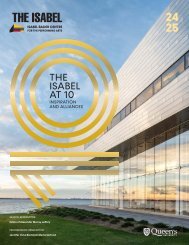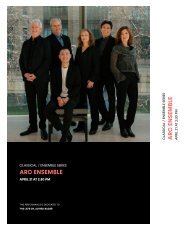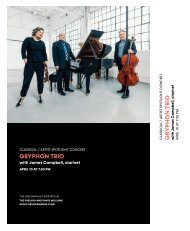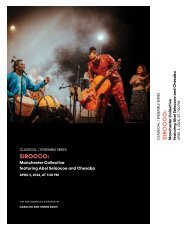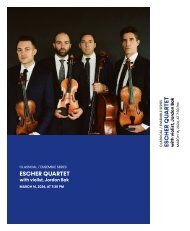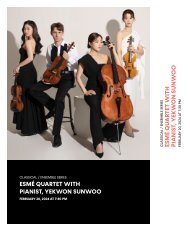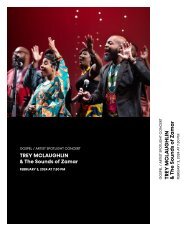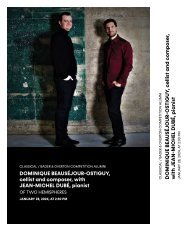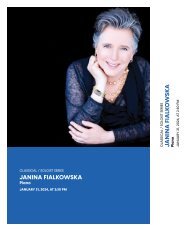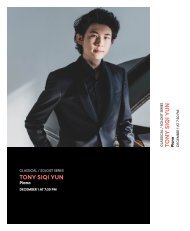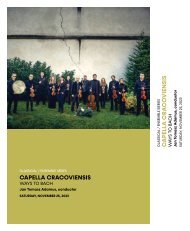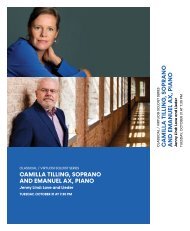Chanticleer | October 28, 2023 | House Program
Create successful ePaper yourself
Turn your PDF publications into a flip-book with our unique Google optimized e-Paper software.
ENSEMBLE SERIES<br />
CHANTICLEER<br />
Music of a Silent World<br />
SATURDAY, OCTOBER <strong>28</strong>, <strong>2023</strong>, 7:30 PM<br />
ENSEMBLE SERIES<br />
CHANTICLEER<br />
Music of a Silent World<br />
SATURDAY, OCTOBER <strong>28</strong>, <strong>2023</strong>, 7:30 PM
ENSEMBLE SERIES<br />
CHANTICLEER<br />
Music of a Silent World<br />
PROGRAM<br />
Tavian Cox, Cortez Mitchell, Gerrod Pagenkopf*,<br />
Bradley Sharpe, Logan Shields, Adam Brett Ward | countertenor<br />
Vineel Garisa Mahal*, Matthew Mazzola, Andrew Van Allsburg | tenor<br />
Andy Berry*, Jared Graveley, Matthew Knickman | baritone and bass<br />
Tim Keeler | Music Director<br />
Lost in the Stars†<br />
Kurt Weill (1900-1950), arr. Gene Puerling<br />
Abendständchen – op. 83, no. 3 Max Reger (1873-1916)<br />
Stardust<br />
Hoagy Carmichael (1899-1981), arr. Jared Graveley<br />
Little April Shower<br />
The Weather<br />
Wildflowers<br />
Blue Skies†<br />
Somebody to Love†<br />
†These pieces have been recorded by <strong>Chanticleer</strong>.<br />
Frank Churchill (1901-1942), arr. Adam Brett Ward<br />
Clyde Lawrence, Gracie Lawrence, Jonathan David<br />
Bellion, Jonathan Koh, Jordan Cohen,<br />
arr. Vineel Garisa Mahal<br />
Tom Petty (1950-2017), arr. Tim Keeler<br />
Irving Berlin (1888-1989), arr. Jennings<br />
Freddie Mercury (1946-1991), arr. Peterson<br />
arrangement commissioned by <strong>Chanticleer</strong> in 2011<br />
*Andy Berry occupies The Eric Alatorre Chair given by Peggy Skornia. Vineel Garisa Mahal occupies The Tenor Chair, given by<br />
an Anonymous Donor. Gerrod Pagenkopf occupies The Ning G. Mercer Chair for the Preservation of the <strong>Chanticleer</strong> Legacy,<br />
given by Ning and Stephen Mercer.<br />
II<br />
Cibavit eos Heinrich Isaac (1450-1517)<br />
Innsbruck, ich muss dich lassen<br />
Isaac<br />
Lieblich hat sich gesellet – op. 83, no. 2<br />
Reger<br />
I Remember<br />
Stephen Sondheim (1930-2021), arr. Joseph Jennings<br />
III<br />
I Am a Tree from The Rivers are our Brothers<br />
Majel Connery (b. 1979), arr. Majel Connery<br />
and Doug Balliett<br />
arrangements co-commissioned by <strong>Chanticleer</strong> and<br />
Musica Sierra in <strong>2023</strong> with support from Ken Grant<br />
I miss you like I miss the trees Ayanna Woods (b. 1992)<br />
Abschied – op. 83, no. 9<br />
Reger<br />
Willow Weep for Me†<br />
Ann Ronell (1905-1993), arr. Jennings<br />
—INTERMISSION—<br />
IV<br />
I Am a River from The Rivers are our Brothers<br />
Washing of the Water†<br />
V<br />
I Am the Air from The Rivers are our Brothers<br />
Hochsommernacht – op. 83, no. 5<br />
Eine ganz neue Schelmweys – op. 83, no. 6<br />
VI<br />
I Am a Cloud from The Rivers are our Brothers<br />
Both Sides Now†<br />
VII<br />
(to be selected from)<br />
I Am Snow from The Rivers are our Brothers<br />
Shenandoah†<br />
Connery, arr. Connery and Balliett<br />
Peter Gabriel (b. 1950), arr. Mason Bates<br />
arrangement commissioned by <strong>Chanticleer</strong> in 2013<br />
Connery, arr. Connery and Balliett<br />
Reger<br />
Reger<br />
Connery, arr. Connery and Balliett<br />
Joni Mitchell (b. 1943), arr. Vince Peterson<br />
arrangement commissioned by <strong>Chanticleer</strong> in 2013<br />
Connery, arr. Connery and Balliett<br />
Traditional, arr. Marshall Bartholomew<br />
and James Erb<br />
PROGRAM NOTES<br />
A river gurgles. Wind rushes. Branches creak.<br />
Snowflakes faintly fall. Every piece of the world<br />
has a sound. But if you listen really closely, you<br />
might also find that each of these pieces has a<br />
voice. In Music of a Silent World, <strong>Chanticleer</strong> sings<br />
the songs of the natural world and gives a voice<br />
to the otherwise voiceless rocks and stones and<br />
trees and rivers that share this planet with us.<br />
While inhabiting those voices, we also explore<br />
what the world might be like without them.<br />
The program centers around a new arrangement<br />
of Majel Connery’s song cycle, The Rivers are our<br />
Brothers, which was written in, around, and about<br />
the Sierra Nevada mountains. Each movement<br />
inhabits a different part of the Sierra’s natural<br />
beauty: from its high peaks to its forests, rocks,<br />
rivers, and snowbanks. “The goal,” she says, “is<br />
to give nature a voice. I wanted to allow these<br />
vibrant things to speak on their own behalf.”<br />
By giving agency to these inanimate parts of<br />
our world, we are compelled to empathize with<br />
otherwise silent beings, uncovering their unique<br />
characters, personalities, and motivations. Majel<br />
describes herself as a “vocalist, composer and<br />
roving musicologist making electro-art-dreampop<br />
with repressed classical influences.” She tours<br />
frequently with her art-rock band Sky Creature<br />
and is the host and producer of A Music of Their<br />
Own—a podcast exploring female experiences in<br />
the music industry (CapRadio/NPR).<br />
Woven around her song cycle and in dialogue<br />
with those vibrant parts of the natural world<br />
are works from across the choral spectrum,<br />
including selections from Max Reger’s Zehn<br />
Gesänge für Männerchor (Opus 83). Written in<br />
1904 for the Vienna Men’s Choral Society, much<br />
of this collection features early German Romantic<br />
poetry about nature, which Reger sets with his<br />
typically dense, late Romantic harmony, where<br />
chromatic voice leading is the standard instead<br />
of the exception (“Abendständchen,” “Abschied,”<br />
and “Hochsommernacht”). Paired with these<br />
harmonically complex movements are simple<br />
songs in four-part harmony that hearken back<br />
to the early days of German Männerchor singing.<br />
“Lieblich hatt sich gesellet” is a lilting love song,<br />
and “Eine gantz neue Schelmweys” is a lively<br />
drinking song. Admittedly, these two movements<br />
also have their fair share of 20th-century<br />
harmonic twists and turns, but their sentiment is<br />
one of nostalgia.<br />
The concert begins by placing us and our natural<br />
world in a larger context. Kurt Weill’s “Lost in<br />
the Stars” comes from his musical adaptation<br />
of Alan Paton’s novel, Cry, the Beloved Country.<br />
Set in the years immediately before apartheid<br />
in South Africa, Paton’s Black protagonist,<br />
Stephen Kumalo, sings “Lost in the Stars” when<br />
confronting a crisis of faith in the face of an unjust<br />
society. His feelings of helplessness resonate<br />
today, as we continue to grapple with our<br />
respect for each other and for the natural world.<br />
Gene Puerling arranged “Lost in the Stars” for<br />
<strong>Chanticleer</strong> in 1995.
Our own bass-baritone, Jared Graveley, arranged the<br />
Hoagy Carmichael tune, “Stardust.” Its melancholy<br />
tone sets the stage for the second set of the<br />
program, which explores feelings and sentiments<br />
that might exist if we were to lose our connection<br />
with the natural world. “Innsbruck, ich muss dich<br />
lassen,” by the Netherlandish Renaissance composer<br />
Heinrich Isaac, is a lament on leaving the city of<br />
Innsbruck, Austria. Nestled among the Alps and<br />
overlooking the powerful Inn river, Innsbruck was for<br />
Isaac a symbol of stability and a beautiful home. In<br />
this program, Innsbruck represents an idyllic former<br />
world untouched by concerns of a changing climate.<br />
Due to his talent and popularity, Isaac was one of the<br />
first musicians in history to be called a “composer”<br />
by his contemporaries. His music remained popular<br />
into the 20th century, with many German Romantics<br />
considering him a kind of national and musical<br />
ancestor of J.S. Bach. Isaac wrote prolifically in<br />
many languages, genres, and styles, but his largest<br />
undertaking by far was the Choralis Constantinus,<br />
a collection of over 375 settings of Mass propers in<br />
three volumes. “Cibavit eos,” an introit for the Feast<br />
of Corpus Christi, comes from this collection.<br />
Stephen Sondheim wrote “I remember” for the 1966<br />
made-for-TV musical, Evening Primrose, which tells<br />
the story of a small community hiding from the<br />
outside world and living in a department store. “I<br />
remember” is sung by a young woman, Ella, who has<br />
not seen the sky for 13 years. The plot is admittedly<br />
bizarre, but Ella’s aching text, “I remember sky, it<br />
was blue as ink, or at least I think…” takes on new<br />
meaning for those of us around the country who<br />
are all-too-familiar with smoke and haze and orange<br />
skies, or who find themselves spending most of their<br />
time indoors because of extreme heat.<br />
The third set begins our exploration of Connery’s<br />
song cycle and features a new work by our<br />
composer-in-residence, Ayanna Woods. “I miss<br />
you like I miss the trees” takes its text from Franny<br />
Choi’s 2019 poem, “How to Let Go of the World.” It is<br />
an intense exploration of climate grief, and wrestles<br />
with feelings of helplessness in the face of powers<br />
beyond our control. Ayanna Woods is a GRAMMYnominated<br />
performer, composer and bandleader<br />
from Chicago. Her music explores the spaces<br />
between acoustic and electronic, traditional and<br />
esoteric, wildly improvisational and mathematically<br />
rigorous. “I miss you like I miss the trees” is her<br />
third composition for <strong>Chanticleer</strong>.<br />
<strong>Program</strong> notes by Tim Keeler<br />
ABOUT CHANTICLEER<br />
The GRAMMY Award-winning vocal ensemble<br />
<strong>Chanticleer</strong> is known around the world as “an<br />
orchestra of voices” for its wide-ranging repertoire<br />
and dazzling virtuosity. Founded in San Francisco<br />
in 1978 by singer and musicologist Louis Botto,<br />
<strong>Chanticleer</strong> quickly took its place as one of the<br />
most prolific recording and touring ensembles in<br />
the world, selling more than one million recordings<br />
and performing thousands of live concerts to<br />
audiences around the globe.<br />
Rooted in the Renaissance, <strong>Chanticleer</strong>’s repertoire<br />
has been expanded to include a wide range of<br />
classical, gospel, jazz and popular music and to<br />
reflect a deep commitment to the commissioning of<br />
new compositions and arrangements. The ensemble<br />
has dedicated much of its vast recording catalogue<br />
to these commissions, garnering GRAMMY Awards<br />
for its recordings of Sir John Tavener’s Lamentations<br />
and Praises and the ambitious collection of<br />
commissioned works entitled Colors of Love.<br />
<strong>Chanticleer</strong> is the recipient of Chorus America’s<br />
Dale Warland Commissioning Award and the<br />
Chorus America/ASCAP Award for Adventurous<br />
<strong>Program</strong>ming. During his tenure with <strong>Chanticleer</strong>,<br />
its Music Director Emeritus Joseph H. Jennings<br />
received the Brazeal Wayne Dennard Award for his<br />
contribution to the African American choral tradition.<br />
Named for the “clear-singing” rooster in Geoffrey<br />
Chaucer’s Canterbury Tales, <strong>Chanticleer</strong> continues<br />
to maintain ambitious programming in its hometown<br />
of San Francisco, including a large education and<br />
outreach program, and an annual concert series<br />
that includes its legendary holiday tradition<br />
“A <strong>Chanticleer</strong> Christmas.”<br />
<strong>Chanticleer</strong> is a non-profit organization, governed<br />
by a volunteer Board of Trustees, administered by a<br />
professional staff with a full-time professional ensemble.<br />
In addition to the many individual contributors to<br />
<strong>Chanticleer</strong>, the Board of Trustees thanks the following<br />
Foundations, Corporations and Government Agencies<br />
for their exceptional support:<br />
Alphadyne Foundation<br />
The Goatie Foundation<br />
The William and Flora Hewlett Foundation<br />
McNabb Foundation<br />
The Bernard Osher Foundation<br />
The Bob Ross Foundation<br />
San Francisco Grants for the Arts






